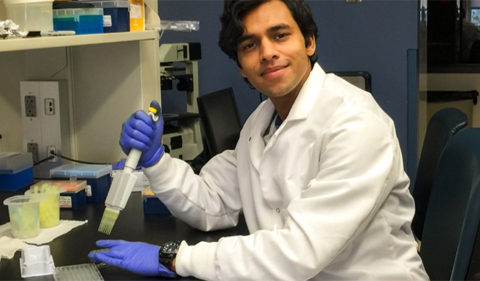Manindra Singh, Ph.D. graduate student in Molecular and Cellular Biology and one of the 2015 winners of the John J. Kopchick Fellowship Award discusses his research.
How did the Kopchick Fellowship award impact you and your research?
The research support that i received with the Kopchick Fellowship provided me the opportunity to work independently on my research under Dr. Fabian Benencia’s supervision at Ohio University. Specifically, I could afford to perform the multiplex immunology experiments that could generate comprehensive information, which is generally not possible in conventional single-target approach. This has proved to be helpful in terms of giving my research a directional approach for more targeted analysis. Additionally, obtaining this competitive award definitely adds weight to my resume, which may prove to be beneficial to strengthen my candidature for post-doctoral positions.
Tell us about your internship that was funded through the Kopchick award.
For my internship, I chose to work for four weeks in Tropical Disease Research program, which is a joint multidisciplinary research program organized by Ohio University’s Tropical Disease Institute (OU-TDI) and Center for Infectious Disease Research (CIEI) at Catholic University of Ecuador in Quito. I opted for Biomedical Research Component and worked with the clinical care program led by Dr. Sharon Casapulla and Dr. Jay Shubrook. My experience while working with this team of clinical investigators and educators was extremely rewarding, both professionally and personally. One of the major goals of this project was to assess the parameters of metabolic risk factors in the local population. I assisted the team of clinicians and medical professionals in sample and data collection, during our field work in local clinic setups.
Additionally, I volunteered in the other biomedical component of the research, the entomology component, for the investigation of household infestation by Triatomine bugs (also called as ‘kissing bugs’), which are the principal vector for the transmission of Trypanosoma cruzi – parasite that causes Chagas Disease. In recent years, several species of this insect vector have been reported in many states and has been linked to an enhanced risk for the transmission of Chagas disease (CDC). While working briefly with the entomological group during my internship, I studied the biology and reproduction of Triatomines, and assisted in the collection of live samples from the infested houses.
Finally, at CIEI in Quito, I briefly worked in the lab of Dr. Marco Neira to understand the biology of the mosquito Aedes aegypti, which is the primary vector of dengue-virus transmission. I studied basic entomological techniques, such as reproductive behavior, gender differentiation, and culture maintenance of this highly resilient vector.
Overall, my experience during this internship was rewarding, especially in terms of learning, teamwork, and future collaborations. Additionally, working in an international and multi-linguistic environment was challenging, and was a great learning experience. This unique experience was certainly not possible without the support I received from Kopchick Fellowship, which I really appreciate and am grateful for.



















Comments